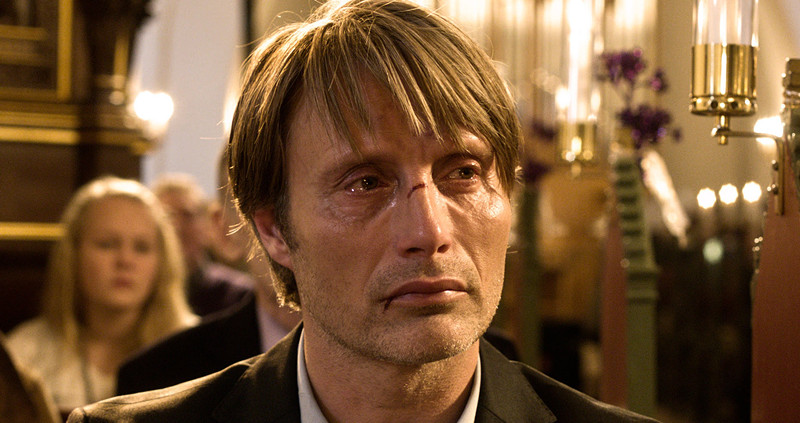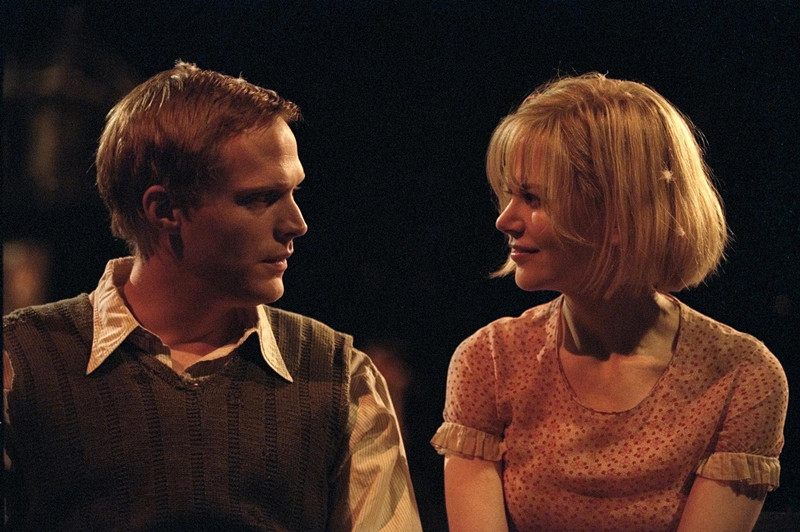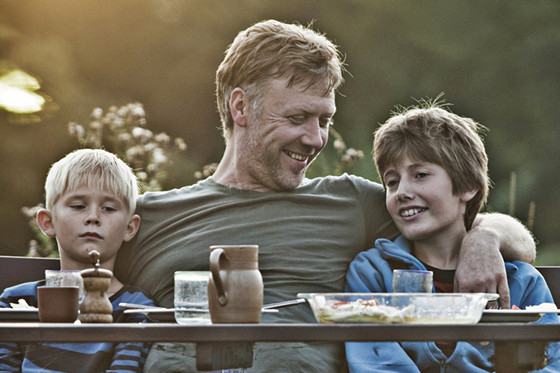6. The Hunt (2012, Thomas Vinterberg)

Broken families are Thomas Vinterberg’s favorite theme. This time, he explores it on a larger scale – how a community breaks due to guilt over something that hasn’t been done. The conflict in “The Hunt” is caused by the psychological phenomena called “fake memories” – a set of unclear or fictional facts that haven’t happened in real life, but are how the person remembers them.
Vinterberg was inspired by true stories of fake memories, a topic developed by psychologist Elizabeth Loftus.
The source of the lie is a cute little girl, who is hard to blame for the consequences of her actions. She accuses her teacher in Kindergarten, with whom she is in love, of molesting her sexually. Then the film focuses on the innocent Lucas (Mad Mikkelsen) and his battle for survival against an invisible enemy – people’s fears and projections. We see a modern civilized city going back to the witch hunt of the middle ages.
The film starts with a deer hunt, followed by a human hunt, where the whole community turns against one innocent man and he is forced to carry all the sins – not his own, but the ones of the society.
7. Dogville (2003, Lars von Trier)

Lars von Trier likes to experiment with the possibilities given by cinema and with “Dogville” he almost reaches the limit. The film is so minimalistic that there is nothing left on the screen but the actors and some chalk marks on a blackboard. In this epic time and space, we can see the characters all the time – nothing can be hidden from the audience.
You can analyze “Dogville” by different angles. You can see it as the conflict between the individual and the society. Grace comes to the city of Dogville not knowing any social rules and from the first meeting with Tom he starts teaching her what to do and what not to do. She accepts all these rules, set by the people from Dogville and this works well for a while. Her agreeableness makes the people from Dogville more and more demanding, a metaphor for the society enslaving us with social norms.
Another way the film can be seen is as the conflict between good and evil, and what comes first in the human nature. In the beginning, Grace relies on the mercy of the villagers and they are merciful. But this is only what the ordinary people think they are supposed to do to a stranger. With time, the more they realize their power, the more aggressive and dominant they become.
8. In a Better World (2010, Susanne Bier)

The film “In a Better World” or “Revenge” (Original Danish title) got Susanne Bier the Oscar for Best Foreign Language Film in 2010. The story builds around the comparison of an African refugee center and a Danish school. The moral dilemmas in the film address the two Biblical questions – an eye for an eye, or when slapped, turning the other cheek.
The characters in the film deal in different ways with the problem of aggression and violence. The father Anton puts his moral duty and his ideal that everything should be solved with no harm, above feelings of revenge. People around him think otherwise, including his son and his new friend. Throughout the film, the ethical choices are tested with their pros and cons in the contemporary life.
9. Oslo, 31 August (2011, Joachim Trier)

The psychologically troubled character from “Reprise,” the first feature film by Joachim Trier, comes to new light with “Oslo, 31 August.” Played by the same actor, Andres Lie, this time the protagonist is a young drug addict who tries to come back to his former life after rehab.
The young Andres is alienated from his friends and family. With the film we further explore his feelings about his parents, his sister, his best friend and the girls in his life, and it actually seems that the loneliness is not the consequence, but the initial reason for his behavior.
The film is based on a French novel and actually parallels the story in “Hunger” by Knut Hamsun. As did the young starving writer, Anders wanders around Oslo in search for something. The same way Hamsun’s character looks for food, Anders looks for his memories and his feelings of love and connection.
The city of Oslo in the film is a character on its own. Actually, the idea for the title comes from Woody Allen’s “Manhattan.” The date 31st of August is chosen, because this is the last official day of summer and the date which outdoor swimming pools close.
The film starts with an experiment by Trier – he interviews citizens of Oslo and asks them to formulate their answers with the words “I remember…” as he thinks memories are very important part of life.
An interesting scene to look for in “Oslo, 31 August” is the one in the café, where Anders listens to a girl who reads out to a friend 50 things she hopes will happen in her life. This comes from a popular radio show in Norway, where people were asked to tell 50 things they would like to have in their life and Trier really enjoyed this girl and her list, so he asked her to participate in the film and read the list in the café scene.
10. The Square (2017, Ruben Ostlund)

When it comes to uncomfortable topics and situations, Ruben Ostlund has distinguished himself as a master of the craft. If you have watched his previous films, you cannot forget the awkward moments he put his characters through, like the scared father who runs and abandons his wife and children during an avalanche, which happens to be just a scheduled one.
The funny side of masculinity is mocked also in “Play” where the fathers fail to punish the black robbers of their sons, because of political correctness. Ostlund has no shame in portraying the ridiculous in life, and there is nothing sacred to him, including art.
With his last film, the Palme d’Or winner “The Square,” he shows us another civilized white man who is curator of an art gallery without being sure what the exhibited art is actually about. He is confronted by a woman who asks him to explain some piece of exhibition, and he is only able to give a very vague answer. His inability to act accordingly to the social and personal situations makes the film so funny, yet so disturbing to our personal ego.
Author Bio: Mirella Vasileva is a journalist and film critic from Bulgaria. She is specialized in Nordic cinema.